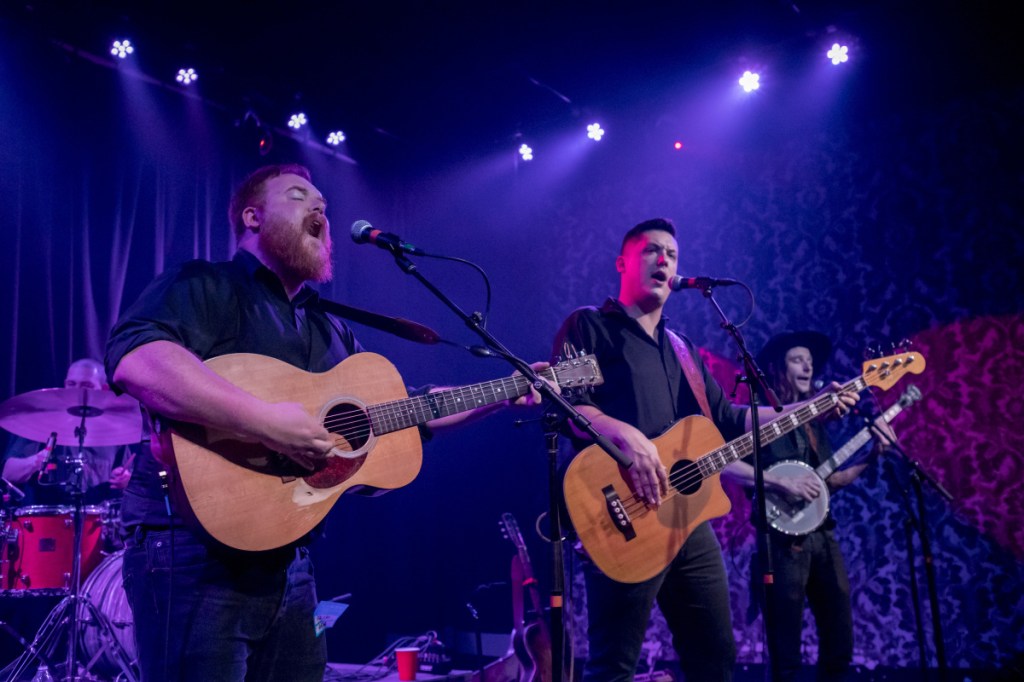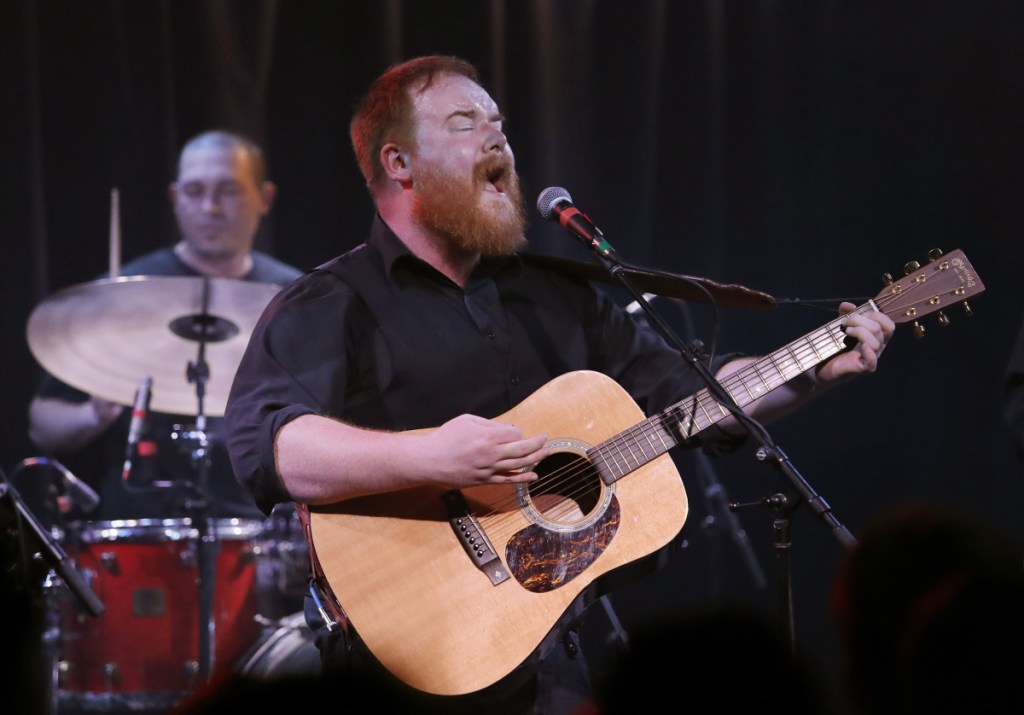Of the 30 or so bands he’s represented during his career as a booking agent, Joshua Knight has only signed one without ever seeing it play live: The Ghost of Paul Revere.
“I heard their record way before it was ready to come out, and I was completely moved beyond words,” said Knight, a Chicago-based booking agent who has worked with Los Lobos, Aaron Neville and Lettuce, among others. “When I heard the songs, I could picture myself in whatever they were singing about. I connected instantly.”
Self-described practitioners of “holler folk,” the Portland band’s music is built on a foundation of vocal harmonies and acoustic string instruments. The Ghost of Paul Revere had been building a loyal following around Maine for four or five years when Knight signed on as its booking agent in the fall of 2016. In the year and a half since, the band has played major festivals, like Mountain Jam in the Catskill Mountains of New York and Hardly Strictly Bluegrass in San Francisco, released a new album and gained critical praise.
The new album, “Monarch,” was mastered in Portland by Adam Ayan, who has worked with Lady Antebellum, Sarah McLachlan and Reba McEntire, among many other Grammy-nominated acts. The band is also working with a national public relations firm, Shore Fire Media. Now, its three members – Griffin Sherry, Max Davis and Sean McCarthy – who have known each other since pre-school, are hoping their music, ambition and supporters will help them reach even more listeners and make music their career.
The band sold out two shows at Port City Music Hall in Portland in late December, selling more than 1,000 tickets between them. Several Maine shows are booked for the new year, including a sold-out show Feb. 9 at Stone Mountain Arts Center in Brownfield, before the band heads out on the road to play venues and festivals across the country.
A SOUND THAT STANDS OUT
“Monarch” came out in October. The band’s original songs often meld traditional folk instruments – banjo and acoustic bass, for instance – with more contemporary-sounding arrangements. Some songs sound like old foot-stomping bluegrass, while others sound like contemporary ballads that happen to have banjo.
The band calls their music “holler folk,” which they say is a nod to the “field holler” singing style of slaves, field workers and prison inmates. For them, the label evokes a communal form of music created by people who recognize “we’re all in this together,” McCarthy said.
“I think it’s the harmonies and the songwriting that makes them stand out,” said Brian Farrell, music director of Portland radio station WCLZ. “And I think what’s capturing the attention of a lot of people in the music industry is how often they are on the road, sharing the bill with people like the Infamous Stringdusters and The Revivalists, and just getting in front of an awful lot of people.”
Sherry, McCarthy and Davis are all the same age: 30. McCarthy is from Hollis, while Davis and Sherry are from neighboring Buxton. Growing up, they went to all the same schools together until graduating from Bonny Eagle High School. Sherry and Davis also both went on to study art at Alfred University, near Rochester, New York.
They played in school bands together and sang in school choruses, and just for fun, a long time before giving any thought to forming a band or making music for a living.
After earning his degree in fine arts in 2010, Sherry came back to Maine and was working at Artist & Craftsman Supply in Portland. He always loved to sing and play guitar, and he got a gig once a month at Dogfish Bar & Grille in Portland. Davis and McCarthy would go there to cheer him on. They started singing back-up for him once in a while, getting paid in the form of a couple free beers, if they were lucky.
“Sometimes we’d sing, or sometimes we wouldn’t, we’d just be there to listen to Griffin,” said McCarthy, the band’s bassist. “We were just having fun.”
None of the three grew up on bluegrass or old-timey folk, but find that string instruments and harmonies just seem to fit the kind of music they want to make. McCarthy listened to classical music and classic rock, and was later drawn to R&B. Sherry was a rock fan who later discovered bluegrass. Davis began listening to bluegrass after taking up the banjo in college, picking up his roommate’s instrument when he was going through some “artist’s block” and found himself unable to paint.
In 2011, after about a year of hanging out for fun at Dogfish, Sherry, McCarthy and Davis decided they enjoyed making music together so much that they should form a band. Sherry had been performing solo as “Griffin Sherry and The Ghost of Paul Revere.” He says the name came to him seemingly out of nowhere, but he liked the cadence of it.
With a contagious, foot-stomping roots sound focused on harmonies and acoustic string instruments, the three friends formed the band with harmonica and mandolin player Matt Young and built up a loyal following over the next four years or so in Maine. They began drawing comparisons to the Avett Brothers and other contemporary bands with a rootsy sound based on string instruments and on old-timey feel.
Young was with the band until spring of 2017, and the remaining members say they feel they can’t say too much about his departure, other than to cite differences of opinion and the pressures of touring. Young could not be reached for comment.
FINDING SUPPORT
Early in their time together, the band members met Derek Lombardi, who had booked acts for Portland venues like One Longfellow Square and The Big Easy and had managed local acts as well. Someone gave him a recording the band had made, and he was instantly impressed. He started advising them and later became their manager.
Lombardi said he counseled the band on a “less is more” ethic. Instead of playing Portland whenever possible, Lombardi suggested they play only once a year and play more around the state, New England and beyond.
“If you play too many shows, people feel they can see you anytime, and there’s no sense of urgency,” said Lombardi.
Sherry, McCarthy and Davis said the fact that they were from the relatively small towns of Buxton and Hollis helped. Whenever they’d play Portland early on, or anywhere within an hour of their hometowns, people from those towns would come out in droves to see them.
When they played Port City Music Hall for the first time in 2014, they were terrified, Sherry said. They had been used to playing to crowds of 50, and Port City holds more than 500. But their friends and acquaintances, as well as fans of their music, helped ease their fears. The next year, they went on a 55-venue tour around the country, and at the end of the year, they headlined a New Year’s Eve show at Portland’s State Theatre, with a capacity of more than 1,600.
While touring and building a fan base, the band released three recordings, mostly of the kind of songs they do live. But in 2016, they decided to a studio album that would feature more instruments, including drums and cello, and more arranging than their previous works. They chose Jonathan Wyman, a sought-after Maine recording engineer and producer, and began work on what would become “Monarch.”
The songs come from everyday life, mundane everyday life, sometimes. The first line of “Little Bird” came to Sherry as he was sitting at a friend’s house in Philadelphia after a gig. He saw a little bird sitting on a power line and started singing to it as he worked out the music on his guitar: “Oh little bird, sitting on a power line. Sweet little thing, don’t you know, you caught my eye. Spread your wings, and come over to me.”
“The first line was sort of a joke, just some nonsense words I could sing while working out the melody,” said Sherry.
Davis wrote “Chrysalides” – a name for various kinds of insect pupa – after hearing a fiction podcast about a massive amount of pigeons and the deafening noise their collective wing-flapping made.
“Montreal,” written by Sherry, is a soulful lament about lovers drifting apart: “Remember how it used to be when love for us was so easy? Then one day, it turned around, an empty house without a sound, now. Are we growing apart or are we growing up?” The song is carried by strong strumming that seems to get more powerful as the song goes on, along with Sherry’s voice.
Last year, before “Monarch” came out, the band played Mountain Jam in the Catskills of New York, where the late Tom Petty was the headliner, as well as DelFest, the Maryland festival named for bluegrass legend Del McCoury. In May, the band is scheduled to play the Shaky Knees Festival in Atlanta and the BottleRock Festival in Napa Valley, California.
So far, “Monarch” has not generated a radio hit. But Knight, the booking agent, thinks The Ghost of Paul Revere’s success will be built by touring, by winning over new fans with live shows, which is pretty common in the music business today.
“We just want to keep on keeping on, making music, hitting the road and playing to as many people as we can,” said McCarthy. “We didn’t start this as a professional calling, we started to have fun, to hear and listen to music. But when we started playing around the country and connecting with audiences, we realized this could be a feasible path for us.”
To see videos of The Ghost of Paul Revere, read this story at PressHerald.com
Ray Routhier can be contacted at 791-6454 or at:
rrouthier@pressherald.com
Twitter: @RayRouthier
Send questions/comments to the editors.






Comments are no longer available on this story